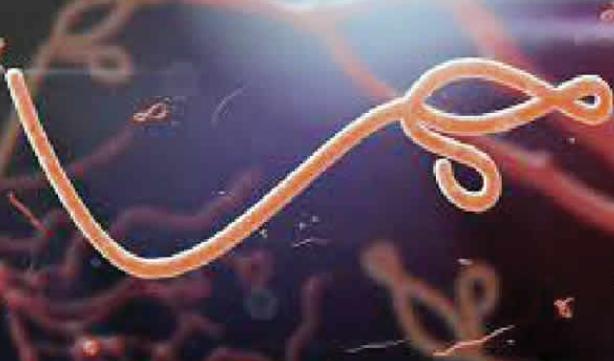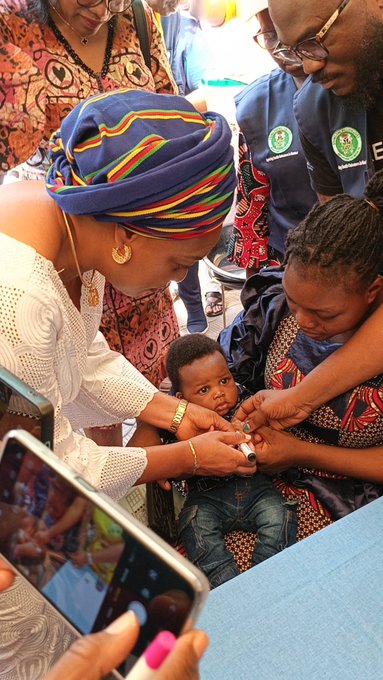Health
BREAKING: Nigeria At High Risk Of Ebola, NCDC Warns

The Nigeria Centre for Disease Control and Prevention has said that Nigeria is at high risk of Ebola virus disease following the outbreak of the disease in Uganda.
The NCDC, in a release on Tuesday, signed by its Director-General, Dr Ifedayo Adetifa, stated that it was on high alert, adding that “the likelihood of importation of the disease to Nigeria is high due to the increased air travel between Nigeria and Uganda, especially through Kenya’s Nairobi airport, a regional transport hub, and other neighbouring countries that share a direct border with Uganda.”
According to the NCDC, the ongoing outbreak of Ebola virus disease was caused by the Sudan strain of the Ebola virus in Uganda as declared on September 20, 2022.
The statement partly read, “The Uganda Virus Research Institute confirmed the virus in samples collected from a 24-year-old male who exhibited symptoms of the disease and later died as a result in Mubende District in the Central Region about 175km from the capital, Kampala. As of September 29, 2022, the Ugandan Ministry of Health has reported 54 cases (35 confirmed and 19 probable) and 25 deaths (seven confirmed and 18 probable). The Ugandan Ministry of Health with support from the WHO is working to effectively respond to and contain the spread of the virus.
READ ALSO: 2023: ‘I Have Nigeria’s Solution, Many People Wasting Their Time’ – Fr. Mbaka
“The NCDC-led multisectoral National Emerging Viral Haemorrhagic Diseases Technical Working Group working with partners and stakeholders has conducted a rapid risk assessment to guide in-country preparedness activities. The NEVHD TWG coordinates preparedness efforts for EVD and other emerging viral haemorrhagic diseases.
“Based on available data, the overall risk of importation of the Ebola virus and the impact on the health of Nigerians has been assessed as HIGH for the following reasons:
“The Sudan Ebola Virus does not currently have an effective drug for treatment or licensed vaccine for prevention.
“The extent of the outbreak in Uganda has not yet been ascertained as investigations have shown that some persons may have died with similar symptoms which were not reported to health authorities. In addition, their burials were not conducted safely to prevent transmission.
“The case fatality rate of the Sudan virus varied from 41% to 100% in past outbreaks.
“The likelihood of spread in Nigeria following importation is high due to the gatherings and travel associated with politics, the coming yuletide as well as other religious gatherings and festivals during the last few months of the year.”
However, the NCDC said, despite this risk assessment, Nigeria had the capacity – technical, human (health workforce), and diagnostic – to respond effectively in the event of an outbreak.
READ ALSO: End ‘Spiral Of Violence, Death’ In Ukraine, Pope Francis Begs Putin
“Currently, no case of EVD has been reported in Nigeria. Nonetheless, the Nigerian government through the NCDC’s multisectoral NEVHD TWG has put several measures in place to prevent and prepare for immediate control of any outbreak of the disease in-country,” it noted, adding that the NCDC Incident Coordination Centre is now in alert mode.
“Passengers arriving from Uganda and persons who transited in Uganda are being followed up for 21 days of their arrival in Nigeria on their health status.
“Trained Rapid Response Teams are on standby to be deployed in the event of an outbreak.
“Public Health Emergency Operations Centres in states with major points of entry, that is, Lagos, Kano, Abuja, and Rivers states are on standby. A medical countermeasures plan is available.
“Amplification of risk communication and engagement with states and partners to strengthen preparedness activities which include– a review of risk communication protocols, plans, and messages in the event of an outbreak,” the NCDC added.
PUNCH
Health
LASG FLags Off Polio Outbreak Response Campaign

The Lagos State Government, through the Lagos State Primary Health Care Board, has launched the 2025 Polio Outbreak Response Campaign, reaffirming its commitment to eradicating polio and safeguarding the health of its children.
The ceremony, held at the Simpson Primary Healthcare Centre, was led by the First Lady of Lagos State, Dr. (Mrs.) Claudiana Ibijoke Sanwo-Olu, represented by Mrs. Widad Jumoke Mustafa, a member of the Committee of Wives of Lagos State Officials (COWLSO).
In her address, the First Lady emphasised the state government’s proactive measures to keep Lagos polio-free, highlighting the critical importance of the campaign in preventing the debilitating effects of poliomyelitis, which can result in paralysis or death.
READ ALSO: IMPEACHMENT: Lagos Ex-Speaker, Obasa’s ‘Sins’ Revealed
The First Lady also called on parents, community leaders, and stakeholders to support the campaign by ensuring eligible children are vaccinated.
Targeting children aged 0-59 months, vaccination teams will administer the Oral Polio Vaccine (OPV) to prevent virus transmission.
Dr. Kemi Ogunyemi, the Special Adviser on Health, expressed gratitude to Lagosians for their continued cooperation in the fight against polio. While appreciating all healthcare workers and partners for their services, Mrs. Ogunyemi encouraged parents to present their children and wards for the exercise.
Also speaking, the Chairman of Lagos Mainland Local Government, Mrs. Omolola Rashidat Essien opined that Immunization is key in ensuring that children are kept safe from polio and other vaccine preventable diseases.
Dr. Abimbola Bowale, the Supervising Permanent Secretary, Lagos State Primary Health Care Board, who also spoke at the event, underscored the life-saving importance of immunization.
“All children aged 0-59 months need multiple doses of the polio vaccine to ensure full protection. Any child missed represents a potential risk for the poliovirus to spread. The vaccine is safe, effective, and crucial in keeping our communities polio-free,” he stated.
Dr. Bowale also outlined several strategies to ensure the success of the campaign, including fixed post teams stationed at primary healthcare centres and public health facilities, house-to-house visits, and a transit strategy to reach special locations such as places of worship, schools, motor parks, and other public venues.
The event concluded with Dr. (Mrs.) Claudiana Ibijoke Sanwo-Olu officially launched the campaign, marking a renewed effort to maintain Lagos State’s polio-free status.
Headline
Lagos Cholera Cases Rise To 421

The Lagos state suspected cholera cases have risen to 421.
The Commissioner for Health, Akin Abayomi disclosed this on his Instagram handle @profakinabayomi on Saturday.
“As of June 20, 2024, an additional four suspected cholera cases have been reported, as illustrated in the accompanying graph,” he wrote.
He noted that the Emergency Operations Centre in collaboration with all relevant partners is actively engaged in contact tracing, community-based surveillance, awareness campaigns, sample testing, and ensuring that confirmed cholera cases receive appropriate medical treatment.
READ ALSO: Two Suspects Arrested For Stealing Car From Mosque During Juma’at Prayer
On Friday, the commissioner confirmed 35 cases out of the 417 suspected cases and 24 deaths across 20 Local Government Areas in the state.
The cases were reported from Agege, Badagry, Ikeja, Mushin, Ajeromi-Ifelofun, Epe, Ikorodu, Ojo, Alimosho, and Eti-Osa.
Others were Kosofe, Oshodi-Isolo, Amuwo-Odofin, Ibeju-Lekki, Lagos Island, Shomolu, Apapa, Ifako-Ijaiye, Lagos mainland, and Surulere.
Cholera is a food and water-borne disease caused by ingesting the bacteria— Vibrio cholerae — in contaminated water and food. Cholera can cause severe acute watery diarrhoea, and the severe forms of the disease can kill within hours if left untreated.
In Nigeria, cholera is an endemic and seasonal disease, occurring annually mostly during the rainy season and more frequently in areas with poor sanitation.
READ ALSO: Police Arrest 28yr Old Suspected Cultists, Recover Gun In Delta Community
The World Health Organisation on Thursday announced a spike in cholera in several regions of the world, with almost 195,000 cases and over 1,900 deaths reported in 24 countries since the start of 2024.
WHO said the Eastern Mediterranean Region reported the highest number of cases, followed by the African Region, the Region of the Americas, the Southeast Asia Region, and the European Region.
The global health body, however, noted that there are no reported cases in the Western Region, according to its bulletin released on Wednesday.
It said it exhausted its global stockpile of Oral Cholera Vaccines by March but was able to exceed “the emergency target of five million doses in early June for the first time in 2024.”
Health
AUTISM: What You Need To Know

By Silver Yeibake
Autism, commonly known as Autism Spectrum Disorder (ASD), is a neurodevelopmental disorder that affects communication, social interaction, and behavior. Autism is referred to as a spectrum condition since it can manifest in a variety of symptoms and abilities. While the actual cause of autism is unknown, evidence suggests that genetic and environmental factors interact to influence its development.
The risk factors include a sibling with autism, advanced age of parents, exposure to certain air pollutants and pesticides before birth, extreme prematurity, mothers with diabetes, immune system disorders or obesity, any difficulty with delivery leading to deprivation of oxygen to the baby’s brain, fever during pregnancy, lack of certain vitamins minerals during pregnancy, and certain genetic conditions, such as Down, fragile X, and Rett syndromes.
“Risk factors can not on their own cause a disease. However, they can increase the likelihood of that disease in a person.”
It is important to know that contrary to trending claims online, there is no scientific or medical evidence that vaccines or consumption of sugar are risk factors for autism.
READ ALSO: Kidney Stones: What You Need To Know
Autism is defined by difficulties in social interaction and communication. Individuals with autism may struggle to grasp social cues, maintain eye contact, and engage in typical back-and-forth conversations. Some people may also engage in meaningless, repetitive actions, such as hand-flapping or rocking, and have strong interests in specific areas.
It is essential to remember that autism is a lifelong diagnosis, but with early intervention and adequate care, people with autism can live fulfilling lives.
Autism treatment frequently includes behavioral therapy, speech therapy, occupational therapy, and social skills training. Each individual with autism is unique, thus interventions should be tailored to meet their personal needs and strengths.
In spite of the difficulties that autism can cause, many people with autism possess unique talents and abilities. Some people may succeed in fields such as music, art, mathematics, or programming, thus it is important for society to acknowledge and honor the qualities and achievements of people with autism.
In summary, autism is a complicated and diverse disorder that affects individuals in various ways. By raising autism knowledge, understanding, and acceptance, we can build a more inclusive society in which people with autism can thrive and attain their full potential.
Dr. Yeibake, Weriwoyingipre Silver.
Senior Registrar,
Faculty Of Pediatrics,
WACP

 News5 days ago
News5 days agoHow To Calculate Your Taxable Income

 Metro4 days ago
Metro4 days agoEdo widow-lawyer Diabolically Blinded Over Contract Seeks Okpebholo’s Intervention

 Headline4 days ago
Headline4 days agoRussia Deploys Navy To Guard Venezuelan Oil Tanker Chased By US In Atlantic

 News4 days ago
News4 days agoExpert Identify Foods That Increase Hypertension Medication’s Effectiveness

 Politics3 days ago
Politics3 days agoAPC Leaders, Tinubu/Shettima Group Call For Wike’s Removal As FCT Minister

 Entertainment5 days ago
Entertainment5 days agoVIDEO: ‘Baba Oko Bournvita,’ Portable Drags His Father, Alleges Bad Parenting, Extortion

 Metro5 days ago
Metro5 days agoJUST IN: Court Grants Malami, Wife, Son N500m Bail Each

 Politics4 days ago
Politics4 days ago2027: Details Of PDP Leaders, Jonathan’s Meeting Emerge

 Politics3 days ago
Politics3 days agoWike A ‘Pestilence’ On Rivers, I Resigned Because Of It – Ex-Commissioner

 Headline2 days ago
Headline2 days agoScience Discovers Why Hungry, Broke Men Prefer Bigger Breasts




























